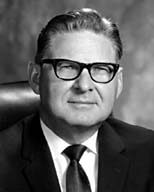A Quote by Ayn Rand
A mystic is a man who treats his feelings as tools of cognition.
Related Quotes
Faith is the commitment of one's consciousness to beliefs for which one has no sensory evidence or rational proof. When man rejects reason as his standard of judgement, only one alternative standard remains to him: his feelings. A mystic is a man who treats his feelings as tools of cognition. Faith is the equation of feelings with knowledge
Now let's move on to the subject of how a real man treats his wife. A real man doesn't slap even a ten-dollar hooker around, if he's got any self-respect, much less hurt his own woman. Much less ten times over the mother of his kids. A real man busts his ass to feed his family, fights for them if he has to, dies for them if he has to. And he treats his wife with respect every day of his life, treats her like a queen - the queen of the home she makes for their children.
Man treats woman as his own property and not as being capable of feelings, like himself. The way man treats women is much worse than the way landlords treat servants and the high-caste treat the low-caste. These treat them so demeaningly only in situations mutually affecting them; but men treat cruelly and as slaves, from their birth till death.
I embrace treats, but I'm also very wary of treats. Treats help us feel energized, appreciated, and enthusiastic - but very often, the things we choose as 'treats' aren't good for us. The pleasure lasts a minute, but then feelings of guilt, loss of control, and other negative consequences just deepen the lousiness of the day.
Every dictator is a mystic, and every mystic is a potential dictator. A mystic craves obedience from men, not their agreement. He wants them to surrender their consciousness to his assertions, his edicts, his wishes, his whims - as his consciousness is surrendered to theirs. He wants to deal with men by means of faith and force - he finds no satisfaction in their consent if he must earn it by means of facts and reason.
Tools may be animate as well as inanimate; for instance, a ship's captain uses a lifeless rudder, but a living man for watch; for a servant is, from the point of view of his craft, categorized as one of its tools. So any piece of property can be regarded as a tool enabling a man to live, and his property is an assemblage of such tools; a slave is a sort of living piece of property; and like any other servant is a tool in charge of other tools.
At the utmost, the active-minded young man should ask of his teacher only mastery of his tools. The young man himself, the subject of education, is a certain form of energy; the object to be gained is economy of his force; the training is partly the clearing away of obstacles, partly the direct application of effort. Once acquired, the tools and models may be thrown away.
The pure mystic wishes to approach his God only in the all-embracing love. The yogi, too, walks toward one single aspect of God. The bhakti-yogi keeps to the road of love and devotion, the raja and hatha yogi choose the path of self-control or volition, the jnana yogi will follow that of wisdom and cognition.
Tools arm the man. One can well say that man is capable of bringing forth a world; he lacks only the necessary apparatus, the corresponding armature of his sensory tools. The beginning is there. Thus the principle of a warship lies in the idea of the shipbuilder, who is able to incorporate this thought by making himself into a gigantic machine, as it were, through a mass of men and appropriate tools and materials. Thus the idea of a moment often required monstrous organs, monstrous masses of materials, and man is therefore a potential, if not an actual creator.
Intuitive cognition of a thing is cognition that enables us to know whether the thing exists or does not exist, in such a way that, if the thing exists, then the intellect immediately judges that it exists and evidently knows that it exists, unless the judgment happens to be impeded through the imperfection of this cognition.



































